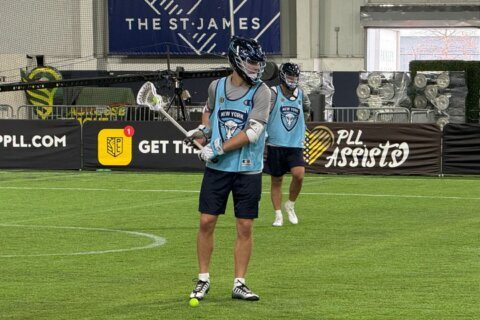WASHINGTON — A few weeks ago, the International Olympic Committee formally recognized the World Flying Disk Federation. That was a big deal in the world of Ultimate Frisbee, a huge step along the sport’s path to consideration as a full-fledged Olympic sport.
But these things take time. You won’t see Ultimate in Rio de Janeiro in 2016. Nor will you see it in Tokyo in 2020. But there is reason to believe that you may see the first-ever gold medal awarded in the sport come 2024.
Washington, D.C. is hardly the mecca of Ultimate Frisbee, but it does sport a team in each professional American Ultimate league, the D.C. Breeze of the American Ultimate Disc League and the D.C. Current of Major League Ultimate. In addition, there is a burgeoning collection of prep club teams around the city. The District of Columbia Sports Athletic Association even held its inaugural Ultimate Frisbee Invitational this spring.
So for those involved in growing the sport on the grassroots level, the IOC news was a welcome sign of support for their efforts.
“For me, this was just a long time coming,” said Matt Dewhurst, general manager of the Current. “I always kind of thought we would get to this point, especially as the last couple years there’s been this swell in the movement to get here.”
For Don Grage, co-owner of the Breeze, part of the excitement came from the fact that it was such a short time period from December, when the IOC first gave the sport partial recognition.
“I think the expectation around the Ultimate community was that it was going to be several years before we got full consideration,” said Grage.
Unfortunately, while Ultimate made a list of 20 or so sports that could have been added in the 2020 Tokyo Olympics, when the field was narrowed from there, it did not make it into the group of finalists. So with the first likely appearance of the sport on the biggest stage still nine years away, the focus turns to the next generation of players.
Wilson High School Ultimate head coach Dave Ohls has seen the game blossom from the ground up over the past few years. He points to athletes migrating to and choosing Ultimate over more traditionally popular sports like baseball and lacrosse.
“There’s definitely huge growth in terms of the number of people playing and the level of athletes playing,” says Ohls.
As for the IOC announcement, he’s happy to see the recognition, but thinks the push toward legitimacy was already rolling along.
“I think it will help some, but my sense is that it was already underway to some degree,” he said.
One potential stumbling block holding back the fluid development of the game is that, while college Ultimate is very popular and even gets some coverage on ESPN3, it remains a club sport. Without a strong high school foundation, it may be an uphill battle to turn it into a varsity sport with scholarships. But many high schools point to the lack of scholarship opportunities as an excuse to adopt other sports instead.
It’s a chicken-or-egg argument that makes an outside validation, like the IOC’s, so important.
“We need news events like the IOC announcement,” said Grage. “Every one of those events is another step in the process, another step in the legitimacy of the sport, to help convince a couple more (high school) athletic directors or principals to adopt it.”
That could eventually translate to better college talent, the likes that would fill the Olympic Team roster whenever the sport is finally added to the Games.
“If we can get college Ultimate to be a varsity sport, get it recognized by the school, that would be a huge step,” said Dewhurst.
The importance of that recognition extends down to the youth level. The field time that comes with it will be crucial to growing the sport for the middle and high school students just discovering the game. After all, come 2024, they will be the ones on the field competing for gold.







